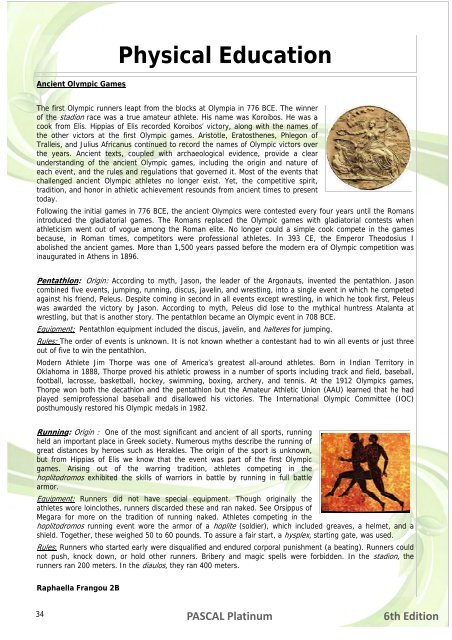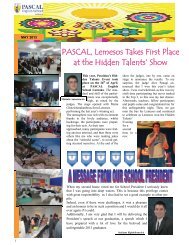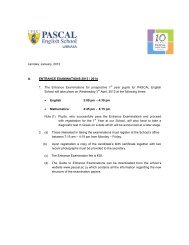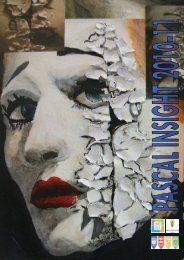PASCAL Platinum 6th Edition
PASCAL Platinum 2010/11 - Pascal Education
PASCAL Platinum 2010/11 - Pascal Education
- No tags were found...
You also want an ePaper? Increase the reach of your titles
YUMPU automatically turns print PDFs into web optimized ePapers that Google loves.
Ancient Olympic GamesPhysical EducationThe first Olympic runners leapt from the blocks at Olympia in 776 BCE. The winnerof the stadion race was a true amateur athlete. His name was Koroibos. He was acook from Elis. Hippias of Elis recorded Koroibos’ victory, along with the names ofthe other victors at the first Olympic games. Aristotle, Eratosthenes, Phlegon ofTralleis, and Julius Africanus continued to record the names of Olympic victors overthe years. Ancient texts, coupled with archaeological evidence, provide a clearunderstanding of the ancient Olympic games, including the origin and nature ofeach event, and the rules and regulations that governed it. Most of the events thatchallenged ancient Olympic athletes no longer exist. Yet, the competitive spirit,tradition, and honor in athletic achievement resounds from ancient times to presenttoday.Following the initial games in 776 BCE, the ancient Olympics were contested every four years until the Romansintroduced the gladiatorial games. The Romans replaced the Olympic games with gladiatorial contests whenathleticism went out of vogue among the Roman elite. No longer could a simple cook compete in the gamesbecause, in Roman times, competitors were professional athletes. In 393 CE, the Emperor Theodosius Iabolished the ancient games. More than 1,500 years passed before the modern era of Olympic competition wasinaugurated in Athens in 1896.Pentathlon: Origin: According to myth, Jason, the leader of the Argonauts, invented the pentathlon. Jasoncombined five events, jumping, running, discus, javelin, and wrestling, into a single event in which he competedagainst his friend, Peleus. Despite coming in second in all events except wrestling, in which he took first, Peleuswas awarded the victory by Jason. According to myth, Peleus did lose to the mythical huntress Atalanta atwrestling, but that is another story. The pentathlon became an Olympic event in 708 BCE.Equipment: Pentathlon equipment included the discus, javelin, and halteres for jumping.Rules: The order of events is unknown. It is not known whether a contestant had to win all events or just threeout of five to win the pentathlon.Modern Athlete Jim Thorpe was one of America’s greatest all-around athletes. Born in Indian Territory inOklahoma in 1888, Thorpe proved his athletic prowess in a number of sports including track and field, baseball,football, lacrosse, basketball, hockey, swimming, boxing, archery, and tennis. At the 1912 Olympics games,Thorpe won both the decathlon and the pentathlon but the Amateur Athletic Union (AAU) learned that he hadplayed semiprofessional baseball and disallowed his victories. The International Olympic Committee (IOC)posthumously restored his Olympic medals in 1982.Running: Origin : One of the most significant and ancient of all sports, runningheld an important place in Greek society. Numerous myths describe the running ofgreat distances by heroes such as Herakles. The origin of the sport is unknown,but from Hippias of Elis we know that the event was part of the first Olympicgames. Arising out of the warring tradition, athletes competing in thehoplitodromos exhibited the skills of warriors in battle by running in full battlearmor.Equipment: Runners did not have special equipment. Though originally theathletes wore loinclothes, runners discarded these and ran naked. See Orsippus ofMegara for more on the tradition of running naked. Athletes competing in thehoplitodromos running event wore the armor of a hoplite (soldier), which included greaves, a helmet, and ashield. Together, these weighed 50 to 60 pounds. To assure a fair start, a hysplex, starting gate, was used.Rules: Runners who started early were disqualified and endured corporal punishment (a beating). Runners couldnot push, knock down, or hold other runners. Bribery and magic spells were forbidden. In the stadion, therunners ran 200 meters. In the diaulos, they ran 400 meters.Raphaella Frangou 2B34<strong>PASCAL</strong> <strong>Platinum</strong><strong>6th</strong> <strong>Edition</strong>
















